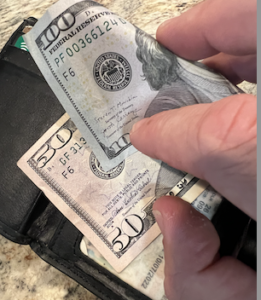 Our Pittsburgh lawyers have explained the damages recoverable in PA for a dog bite. But what happens when your own insurance pays for your medical bills — or lost wages — from an animal attack? Can you still claim those amounts against the person responsible for the attack?
Our Pittsburgh lawyers have explained the damages recoverable in PA for a dog bite. But what happens when your own insurance pays for your medical bills — or lost wages — from an animal attack? Can you still claim those amounts against the person responsible for the attack?
Even though your insurance already compensated you!?
The surprising answer is: Yes.
An Example
Let’s say you have Highmark health insurance when you’re attacked by a dog. Highmark pays for your dog bite related treatment: the ER visit, sutures, antibiotics and even follow-up treatment to monitor how you’re healing and for possible scar revision. Then, this adds up to $10,000. With those medical bills now paid, can the dog owner effectively catch a break and escape having to pay you the $10,000 for your medical bills?
The answer is no.
The canine owner remains liable to pay you the amount paid for your medical treatment, even though a “collateral source” (Highmark) already compensated you. This is called collateral source rule. In fact, Pennsylvania courts apply the collateral source rule, with only a few exceptions discussed below.
Pennsylvania’s Collateral Source Rule
In Pennsylvania, the victim of a dog bite is entitled to the damages caused by the tortfeasor’s misconduct regardless of compensation the victim has received from a “collateral” source. See Denardo v. Carneval, 297 Pa. Super. 484, 444 A.2d 135, 140 (1982) (citing, inter alia, Boudwin v. Yellow Cab, 410 Pa. 31, 188 A.2d 259 (Pa. 1963); Griesser v. National Railroad Passenger, 2000 Pa. Super 313, 761 A.2d 606, 609 (2000).
But isn’t it unfair to get a double recovery?
Reasons Underlying the Collateral Source Rule in PA
The collateral source rule makes sense for two reasons. First, why should the careless dog owner — who caused your harm — benefit from his victim’s choice to pay for health insurance (or lost work insurance)?
Secondly, PA law permits the bite victim’s insurance carrier (Highmark, in the above example) to get paid back out of any settlement. Otherwise, the insurance company can sue the dog owner directly. In fact, the insurer can stand in the shoes of its insured and sue the negligent party for the damages paid. This is called “subrogation.” The right to sue is “subrogated” — or substituted — in favor of the insurance company. As such, the insurance carrier can assert a medical lien against your recovery from the dog owner.
 Thus, in the above scenario — where Highmark paid $10,000 for your medical bills for treatment from a dog bite — Highmark can sue the dog owner directly for 10K. But here’s the problem. The tortfeasor can only be sued once: either by Highmark or the injured victim, but not by both.
Thus, in the above scenario — where Highmark paid $10,000 for your medical bills for treatment from a dog bite — Highmark can sue the dog owner directly for 10K. But here’s the problem. The tortfeasor can only be sued once: either by Highmark or the injured victim, but not by both.
This is the civil court’s version of double jeopardy.
Thus, with the dog owner only able to be sued once by the same victim for the same attack, the party suing — either you or Highmark — must bring all claims at once. If you sue, your can claim your pain, suffering, disfigurement and the amount Highmark paid ($10,000).
The Collateral Source Makes a Double Recovery Possible
So here’s where things can get interesting — and lucrative — for the victim of a dog bite: the collateral can give the injured victim a double recovery.
Here’s how it happens:
- Policy Language. In the above example, the Highmark policy must allow for subrogation — the right to be paid out of the victim’s recovery — for such a right to exist. Thus, absent subrogation language, the Plaintiff-victim can walk away with a double recovery, potentially.
- The Health Insurance Carrier Decides Against Asserting a Lien or Subrogation. Let’s say Highmark (that paid 10K in the above example) decides not to pursue getting paid back from your settlement. Perhaps Highmark decides it’s not worth its time to pursue the claim for repayment. Here again, you get a double recovery.
Various “Collateral Sources” to Consider
The collateral sources include the following:
-
- Lost income insurance benefits from any “collateral source,” such as workers’ comp (below) or short term disability benefits paid by Aflac, MetLife or others.
- Damage to property (torn or punctured clothing) covered by homeowner’s insurance or credit card insurance, if purchased with a credit card.
- Medical Bills, by one’s own health insurance (with a few big exceptions explained below).
Exceptions to the Collateral Source Rule
There are four significant exceptions to the collateral source rule in PA, preventing a double recovery in several common instances:
-
- Medicare Benefits – or benefits paid relative to a Medicare-related insurance policy. Here, Medicare frowns upon the victim receiving a double recovery. In fact, Medicare imposes severe penalties for failing to protect Medicare’s interests when resolving any claim for damages where Medicare paid any portion of the damages in the matter.
- Benefits paid by the Commonwealth of Pennsylvania. These include amounts paid by PA’s Department of Human Services (DHS), or “Medicaid” or one of its administrators. Here, PA’s right to repayment is absolute, like Medicare.
- Private Health Insurance plans organized under federal law, namely ERISA. Here, health insurance plans organized under ERISA are entitled to “medicare-like” priority. Thus, the plan administrator can — and typically will — seek to be repaid out of any settlement with any tortfeasor, where the plan paid any portion of the claim.
- Worker’s comp benefits. Let’s say you’re an Amazon driver, attacked by a dog. You can make a claim for workers’ comp (against Amazon) and also a separate claim against the dog owner. However, Amazon (or its workers’ comp carrier) will seek to be paid back out of your recovery against the dog owner for lost wage and medical benefits paid.
As you can see, the collateral source rule in PA involves the interplay of multiple areas of law. As such, the victim of an animal attack should consult with an attorney who possesses experience in these areas before settling any claim for injuries.
Let’s Get Started
Contact us about damages involving the collateral source rule or otherwise.
412.400.5476